

Self-Assessment: Career Interests. Interests are helpful to understand in relation to career planning.
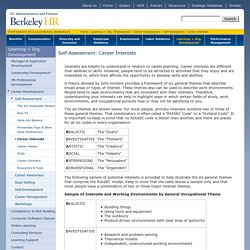
Career interests are different than abilities or skills. However, people tend to be attracted to activities that they enjoy and are interested in, which then affords the opportunity to develop skills and abilities. A theory devised by John Holland provides a framework of six general themes that describe broad areas or types of interest. These themes also can be used to describe work environments. Career Assessment Resources. Assess Use the Assessment Exercises below in conjunction with the SkillScan transferable skills assessment system and complete the Career Profile to create a holistic view of career preferences.
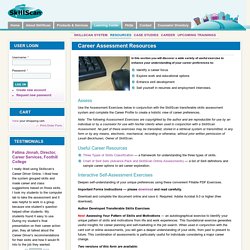
Note: The following Assessment Exercises are copyrighted by the author and are reproducible for use by an individual or by a counselor for use with his/her clients when used in conjunction with a SkillScan Assessment. 25-free-coaching-tools-and-techniques.pdf. Self-Assessment: The Riley Guide. The Riley Guide: Before You Search If you've hit a rut or a roadblock in your career, now may be the time to break out some self-assessments and find out where the problem lies.
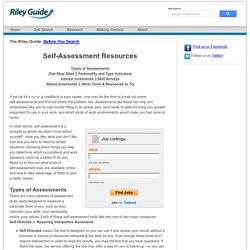
Assessments like these can help you understand why you've had trouble fitting in at certain jobs, what kinds of skills it'd bring you greater enjoyment to use in your work, and which kinds of work environments would make you feel more at home. In other words, self-assessment is a process by which you learn more about yourself - what you like, what you don't like, and how you tend to react to certain situations. Knowing these things can help you determine which occupations and work situations could be a better fit for you. The Myers & Briggs Foundation - The 16 MBTI® Types. Quiet, serious, earn success by thoroughness and dependability.
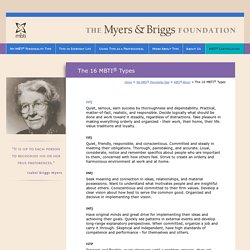
Practical, matter-of-fact, realistic, and responsible. Decide logically what should be done and work toward it steadily, regardless of distractions. Take pleasure in making everything orderly and organized - their work, their home, their life. Value traditions and loyalty. MBTI Basics. The purpose of the Myers-Briggs Type Indicator® (MBTI®) personality inventory is to make the theory of psychological types described by C.
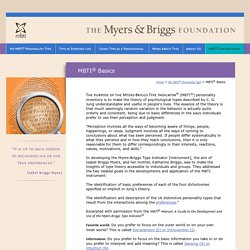
G. Jung understandable and useful in people's lives. The essence of the theory is that much seemingly random variation in the behavior is actually quite orderly and consistent, being due to basic differences in the ways individuals prefer to use their perception and judgment. "Perception involves all the ways of becoming aware of things, people, happenings, or ideas. Untitled. Self Directed Search. The 50 Most Common Interview Questions. LinkedIn. Myers-Briggs. Coaching Tools 101: The Urgent Important Matrix - What is it and How To Use it! Well, Former US President Eisenhower used this so-called “Eisenhower Principle” to organize his tasks.
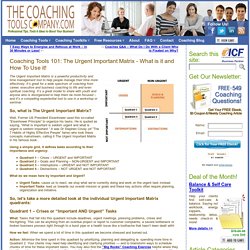
He is quoted as saying, “What is important is seldom urgent and what is urgent is seldom important.” It was Dr Stephen Covey (of “The 7 Habits of Highly Effective People” fame) who took these concepts mainstream, calling it The Urgent Important Matrix in his famous book . Quadrant 1 – Crises or “Important AND Urgent” Tasks What: Tasks that fall into this quadrant include deadlines, urgent meetings, pressing problems, crises and fire-fighting. This can be anything from an overdue project or report to customer complaints, a severe bottleneck or broken business process right through to a burst pipe or a health issue like a toothache that hasn’t been dealt with!
Skills_framework.pdf. The Career Development Cycle - Careers and Employability. Be the Change Career Consulting. The career development process is a cycle that can repeat several times throughout your life.
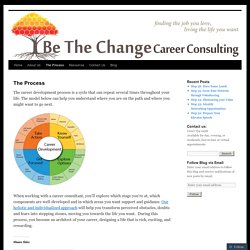
The model below can help you understand where you are on the path and where you might want to go next. When working with a career consultant, you’ll explore which stage you’re at, which components are well-developed and in which areas you want support and guidance. Our holistic and individualized approach will help you transform perceived obstacles, doubts and fears into stepping stones, moving you towards the life you want. During this process, you become an architect of your career, designing a life that is rich, exciting, and rewarding. Like this: Career counselling - Value Cards.
The 50 Most Common Interview Questions. The Career Development cycle. eManual - The Six Steps of Career Development. Step 1: Self assessment This is the foundation of the whole process and essential to professional success!
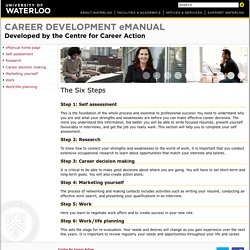
You need to understand who you are and what your strengths and weaknesses are before you can make effective career decisions. The more you understand this information, the better you will be able to write focused résumés, present yourself favourably in interviews, and get the job you really want. Centre for Career Action. In the past, it was typical to complete a prescribed set of studies, find a job in a related field, and stay in that field until retirement.
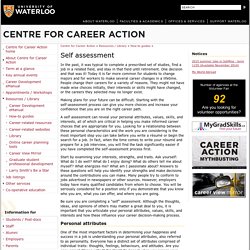
One decision and that was it! Today it is far more common for students to change majors and for workers to make several career changes in a lifetime. People change their careers for a variety of reasons. Goal-Setting: Decision-Making. Decision making exercise. Goal-Setting: Developing a Vision & Goals for Your Career Plan. Developing a Career Vision Statement Having a clear vision of the end state we are trying to achieve before we take action to reach our goals is the key factor in accomplishing any goals that we set.
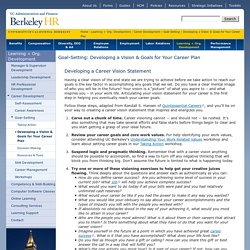
Do you have a clear mental image of who you will be in the future? Self-Assessment: Personality Type & Work Style Preferences. The term "personality" refers to a person's patterns of thinking, feeling and acting. Some aspects of personality are useful in thinking about career development. Four themes for describing personality have been developed from the work of psychologist Carl Jung in a model and tool called the Myers-Briggs Type Indicator (MBTI). The model describes four areas of personality, with two possible preferences in each area. People have a natural preference in each area. Personal SWOT Analysis - Career Planning from MindTools.com. Making the Most of Your Talents and Opportunities Learn how to conduct a personal SWOT Analysis. Chance favors the prepared mind. – Louis Pasteur You are most likely to succeed in life if you use your talents to their fullest extent.
Similarly, you'll suffer fewer problems if you know what your weaknesses are, and if you manage these weaknesses so that they don't matter in the work you do.